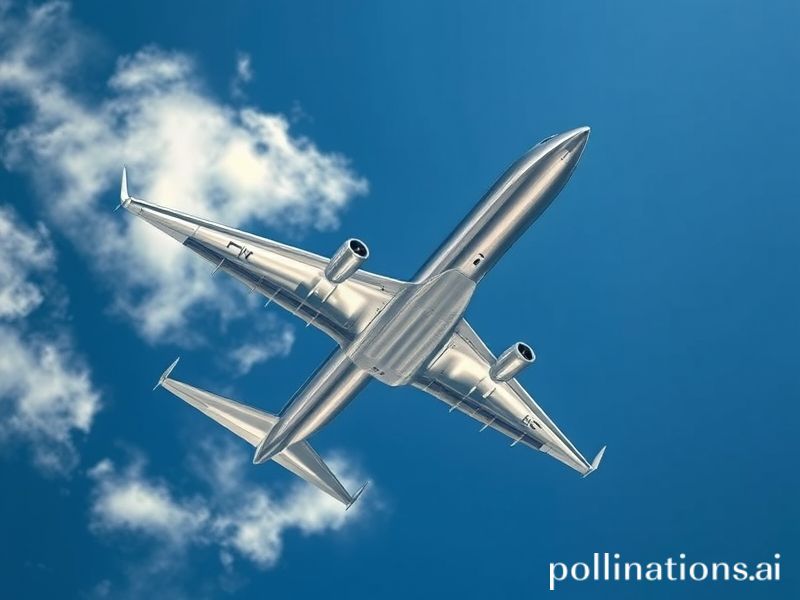Fasten Your Cynicism: How the Global Plane Became Humanity’s Most Ironic Time Machine
Cruising Altitude, Crashing Expectations: The Global Irony of the Humble “Plane”
By the time you finish this sentence, roughly 1,200 commercial aircraft will be aloft, herding 1.5 million souls above weather systems, war zones, and the occasional rogue balloon. From Reykjavík to Riyadh, the aluminum tube—once a miracle, now a flying bus—has become the most potent symbol of our simultaneously connected and combustible planet. We board them to escape borders, then complain when they cross ours. We applaud carbon-offset apps while binge-flying to stag parties in Prague. The plane, dear reader, is the ultimate contradiction with wings.
Consider the geopolitical ballet performed daily at 37,000 feet. Russian titanium still fortifies Boeing fuselages, even as Washington bans Moscow’s airlines from its skies. China’s Comac C919—Beijing’s answer to Airbus, complete with patriotic in-flight announcements—relies on American engines because, well, irony enjoys legroom too. Meanwhile, European carriers quietly refuel in Dubai to circumvent EU sanctions on Russian oil, proving that the only thing more flexible than a Dreamliner’s composite wings is international ethics.
The plane is also history’s fastest courier of bad news. An engine detonates over Denver; within minutes, stock in Rolls-Royce dips in London while Japanese part suppliers field panicked calls at 3 a.m. A drunk passenger in economy tries to open a door mid-Pacific; by touchdown, the clip has trended in Lagos, Lagos-on-Sea, and Los Angeles. We are all eyewitnesses now, thanks to seat-back Wi-Fi and humanity’s bottomless appetite for schadenfreude at cruising altitude.
Climate activists glue themselves to private-jet tarmacs in Geneva, furious that the 1% emits more CO₂ on a single hop to Davos than a Malian farmer does in a lifetime. Their glue, incidentally, arrived by cargo plane. The hypocrisy is so aerodynamic it practically generates lift. Meanwhile, the industry’s PR machine counters with “sustainable aviation fuel” brewed from used cooking oil—because nothing calms an anxious planet like the faint aroma of french fries at 500 knots.
In the Global South, the plane is less lifestyle than lifeline. Kenyan rose growers depend on overnight freighters to deliver Valentine’s bouquets before they wilt; Somali goats board charter flights to Mecca for halal slaughter. These airborne supply chains make economists giddy and poets despair. A yam farmer in Ghana can now reach a Parisian Michelin plate faster than his own daughter can get to the regional hospital. Progress, like turbulence, is uneven.
Security theater adds its own tragicomic subplot. Passengers remove shoes in Boston because one Brit once tried to ignite his sneakers, yet we still allow lithium batteries the size of cinder blocks in overhead bins. The TSA confiscates a toddler’s plastic sword while cargo holds routinely transport actual missiles—albeit “disarmed” and bound for allied dictatorships. Somewhere, Kafka is upgrading to business class.
Then there’s the human cargo: migrant workers flying home on borrowed credit cards, clutching duty-free whiskey like diplomatic immunity; tech bros in lie-flat pods drafting dystopian apps between sips of champagne that cost more than a Bangladeshi month’s wage. The plane compresses class stratification into 200 feet of aluminum: First Class is the afterlife, Economy is purgatory, and Basic Economy is simply hell with narrower seats.
Occasionally, gravity reminds us who’s boss. A MAX-8 nosedives, a Sukhoi disappears over Java, and suddenly every frequent flyer becomes an aeronautical engineer on Twitter. We mourn, litigate, then book the cheapest redeye to wherever the funeral is held—because grief, like everything else, is on a tight schedule.
And yet, for all its sins, the plane remains the closest thing humanity has to a time machine. Breakfast in Lagos, dinner in London, jet lag as your only souvenir. It shrinks oceans, collapses cultures, and lets us pretend distance is dead—right up until the moment we land and remember why we left in the first place.
Fasten your seatbelts. The seat-belt sign never really turns off; it just flickers over the planet itself.







